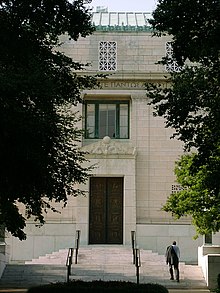
Back الأكاديمية الوطنية للعلوم Arabic الاكاديميه الوطنيه للعلوم ARZ Academia Nacional de Ciencies d'Estaos Xuníos AST ABŞ Milli Elmlər Akademiyası Azerbaijani Нацыянальная акадэмія навук ЗША Byelorussian Нацыянальная акадэмія навук ЗША BE-X-OLD Национална академия на науките на САЩ Bulgarian Acadèmia Nacional de Ciències dels Estats Units Catalan Národní akademie věd Spojených států amerických Czech National Academy of Sciences German
 | |
 The National Academy of Sciences building in Washington, D.C. in 2000 | |
| Formation | March 3, 1863 |
|---|---|
| Founders | Alexander Dallas Bache Abraham Lincoln |
| Founded at | 2101 Constitution Avenue, NW, Washington, D.C., U.S. 20418 |
| Type | NGO |
| Coordinates | 38°53′46″N 77°02′12″W / 38.89598°N 77.03658°W |
Parent organization | National Academies of Sciences, Engineering, and Medicine |
| Endowment | $553.9 million (2020)[1] |
| Website | nasonline |
The National Academy of Sciences (NAS) is a United States nonprofit, non-governmental organization. NAS is part of the National Academies of Sciences, Engineering, and Medicine, along with the National Academy of Engineering (NAE) and the National Academy of Medicine (NAM).
As a national academy, new members of the organization are elected annually by current members, based on their distinguished and continuing achievements in original research. Election to the National Academy is one of the highest honors in the scientific field. Members of the National Academy of Sciences serve pro bono as "advisers to the nation" on science, engineering, and medicine. The group holds a congressional charter under Title 36 of the United States Code.
Congress legislated, and President Abraham Lincoln signed, a 1863 Act of Congress establishing the National Academy of Sciences as an independent, trusted government institution created for the purpose of "providing independent, objective advice to the nation on matters related to science and technology [and] to provide scientific advice to the government 'whenever called upon' by any government department."[2] This objective gave the academy the broad and enduring purpose of enriching and providing resources to any part of the federal government, rather than serving as a tool of one branch or executive agency. The goal was somewhat unusual at the time, and also different than other knowledge based entities serving a branch of government, such as the Library of Congress. The academy receives no compensation from the government for its services.[3]
- ^ As of June 30, 2020. U.S. and Canadian Institutions Listed by Fiscal Year 2020 Endowment Market Value and Change in Endowment Market Value from FY19 to FY20 (Report). National Association of College and University Business Officers and TIAA. February 19, 2021. Archived from the original on February 21, 2021. Retrieved February 20, 2021.
- ^ "Mission". National Academy of Sciences. Archived from the original on October 20, 2023. Retrieved April 15, 2022.
- ^ "Overview: NAS Mission". National Academies of Science. Archived from the original on October 20, 2023. Retrieved April 25, 2015.